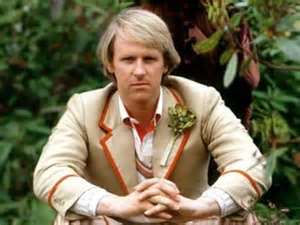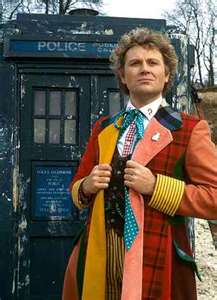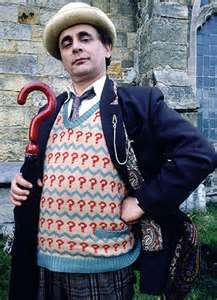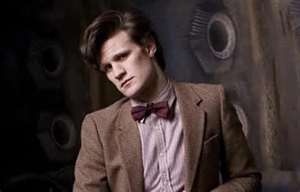I’ve blogged about Doctor Who before, but I decided I should also examine each Doctor and pinpoint one episode that really defines that particular incarnation’s personality. Each Doctor has good episodes to his credit (though some more than others and one for whom this doesn’t quite count, but I’ll get to him later). However, I hope to pin point episodes that are both very good and prime examples of the dominant personality traits present with each Doctor. As such, the episodes I pick aren’t necessarily their best episodes, but they are really good episodes that best show the personality on display. Therefore, we begin with:
1) William Hartnell (1963-1966): “The Daleks”

The first incarnation of the Doctor was not so much a likable presence who bonded with his companions as much as he was a grouchy old man who always seemed one annoyance away from hurling them out into space. He seemed more to tolerate his Earthly companions more than to actually like them. To put biases front and center, I have to admit I am not a fan of Hartnall’s portrayal, and I have not seen many of his episodes, not least because many of his episodes have been lost. Nevertheless, “The Daleks” is a good episode that presents his Doctor accurately. First, you have the Doctor facing his ultimate adversaries (namely, The Daleks), creatures in robot casings, with philosophies of racial cleansing modeled after the Nazi Party. Next, you have the Doctor being a total prick, whose desire to explore a planet and the lengths he will go to to do so nearly getting his entire travelling party wiped from existence. He wants to explore, his companions do not. His plan? He sabotages the Tardis (their spaceship, if you don’t know) so they have to explore to look for necessary repairs. The result? They are captures by the violent Daleks, at war with a peaceful race called the Thals. The Doctors final solution? He convinces the Thals that the only thing to do is not be peaceful, and kill every Dalek in their paths. Granted the Daleks look like they cost about 20 cents to make, the acting is of the Saturday morning cartoon variety, and for anyone who has seen later episodes, the idea that all the Daleks have been destroyed must warrant a snicker, but this episode introduces a potent villain that haunts the Doctor throughout the series and shows the First Doctor at his most irresponsible. (Other options: “The Aztecs”, “The Web Planet”, and the “Tenth Planet”)
2) Patrick Troughton (1966-1969): “The Tomb of the Cyberman”

Unlike Hartnall, I love Patrick Troughton’s portrayal of the Doctor. He is kind and fatherly to his young companions, with a wonderful sense of humor and line delivery. He seems more Bohemian, a kind of cosmic wanderer, who enjoys seeking out new life on foreign worlds. This episode allows him to show off both his comedic line delivery but also his tendency to feign cowardice in order to spring traps on his unsuspecting enemies. This episode also presents another well-known villain (The Cyberman). Granted, they look like they’re wearing lamp shades upon their heads and the actors don’t move in a particularly robotic fashion (they move like the average person does when he’s half asleep but still has to get up out of bed in the morning), but what really makes this episode stand out are the interactions between the Doctor and his companions, including one speech about coping with death that still works beautifully today. (Other options: “Mind Robber”, “The Seeds of Death”, and “War Games”)
3) Jon Pertwee (1970-1974) “Inferno”

Sandwiched between Patrick Troughton and Tom Baker, Pertwee’s Doctor seems a bit bland. His Doctor uses a lot of gadgets, had a car named Bessie, was initially exiled on earth by the high Timelords (the alien race to which the Doctor belongs), and worked with a military unit called . . . well, UNIT. Pertwee does get points for introducing a Timelord nemesis into the villains list, a sort of Moriarty to the Doctor’s Holmes: the Master, who was as brilliant as the Doctor but saw everyone around him only as a pawn to be manipulated and then destroyed. Pertwee played the Doctor as debonair and sophisticated, but that does not mean he made him interesting. However, the surprisingly dark “Inferno” is Master-free, but a good presentation of Pertwee’s Doctor and a cool use of the sci-fi trope that is the parallel world, where everyone you know is different and usually evil (Star Trek even does it very, very well in “Mirror, Mirror”). The Doctor is transported into a parallel Earth, in which everyone he knows is an enemy and Great Britain is run by a fascist regime. Pertwee’s Doctor is forced to operate in world in which no one can be trusted, and it adds interesting levels to his portrayal of a man who usually wants to believe the best of the world but now no longer can. In addition, once everything has been set right, the episode’s ending allows Pertwee the chance to indulge in some witty comedy, at which he excels. (Other alternatives: “Terror of the Autons” “The Sea Devils”, “The Green Death”)
4) Tom Baker (1974-1981): “City of Death”

One of the few almost purely comedic episodes of Doctor Who, “City of Death” is also one of the best the series ever produced. Co written by Hitchhiker’s Douglas Adams, the story’s plot is standard, alien plans to end civilization stuff, but what really makes this episode work so well is Tom Baker’s Doctor. With his 6 ft. scarf, slightly buggy eyes, massively curly hair, and manic grin, Baker’s Doctor is certainly the most iconic. It’s not difficult to see why. He played the role for seven years so many children came of age watching him almost exclusively. In addition, his appearance was so quirky you couldn’t not take notice. He played the character as more alien and eccentric, and his portrayal set the mold against which most Doctors who came after him would be judged. Baker has other episodes that are more serious and probably better done, but none that benefit as much from his line readings and physicality than “City of Death.” Example: The evil henchman throws Baker to the ground. Baker tumbles, sits up, looks at the person in the room, and exclaims, “What a wonderful butler! He’s so violent.” No one could have delivered the line more effectively. It’s a zany episode in which the threat, while extreme as it involves the unmaking of civilization, is never really taken seriously. It’s just a backdrop for jokes and sight gags. It’s a wonderfully, realized episode, with an ending so wonderfully unexpected, you can’t help but laugh. (alternate options: “Ark in Space”, “Deadly Assassin”, “Horror at Fang Rock”)
5) Peter Davison (1982-1985): “Caves of Androzani”

It’s a shame that Davison’s last episode was his best, but at least he went out with a bang (literally, as the planet kind of explodes as the episode concludes). I remember hearing Davison’s Doctor once described as a man for whom things always went wrong and made him look very sad. It’s an unfortunate but accurate summation of Davison, who was young, thin, blonde, quieter than Baker, and looked more vulnerable than any other incarnation. Since he wasn’t as big a personality, many of his episodes feel a bit blah, although I do like Davison’s portrayal. This episode seems best tailored to his vulnerable, more reserved Doctor. It is rare, though not unheard of, for an episode of Doctor Who to wipe out nearly every member of its supporting cast, but it is even rarer to wipe out nearly all of your supporting cast and the Doctor. Arriving in a planet in the midst of a war, the Doctor and his companion are mistaken for spies and are eventually found to be poisoned with Spectrox Toxemia, which will kill them within a few hours. Many episodes of Doctor Who rely on the cliché that the doctor is important and capable– all he has to do is convince people to follow him. The episode twists that idea: The Doctor is just a traveler, but he’s believed to be someone far more important. He’s caught up in a war in which he has no idea how to disentangle himself. In addition, everything he tries to do to help himself and his companion out of a situation only further engrains them in the conflicts around them In addition, Davison’s flippancy and sarcasm present throughout really seems to mean something: he’s mouthing off to short-tempered soldiers. Any of them could get angry and blow his head off. In the end, when the Doctor regenerates into Colin Baker, you feel a real sense of loss and regret that Davison didn’t get to display this much of his acting chops until the end of his run.(alternate options: “Castrovalva”, “Kinda”, “Enlightment” “Warriors of the Deep”)
6) Colin Baker (1985-1987): “Vengeance on Varos”

If it was a shame that Peter Davison’s “Caves of Androzani” was his best episode, it is even more tragic that it is Colin Baker’s best episode as well. Colin Baker’s Doctor felt more like Hartnell’s portrayal. He was arrogant, violent, and seemed to tolerate his companion more than actually like her. His era of the show is often criticized for being excessively violent and there is some truth to that claim. This is especially true in “Vengeance on Varos.” But, this is also one of Baker’s better episodes. The Doctor and his companion arrive on Varos, a planet that televises torture and execution to a mindless audience as a form of entertainment (noticing any commentary directed at a TV audience?). The episode is pretty brutal for a children’s show, and the Doctor seems to have a disregard for life that he hasn’t had in quite a while, but the social commentary about violence as delivered to the masses has a bite that kids would miss, but adults would notice. It’s not great Who, but the show has done much worse, and it serves Baker’s portrayal better than almost any other episode. (Alternate options: “Revelation of the Daleks” “Trial of a Timelord”)
7) Sylvester McCoy (1987-1989) “Curse of Fenric”

Unlike Colin Baker’s portrayal, Sylvester McCoy’s Doctor was completely non-violent, but was a master manipulator. He preferred to talk someone into taking him/herself out, and his method was surprisingly effective. Also, he is remembered for his companion, Ace, who serves as a proto-type for the spunkier, better developed companions of 2005’s revival series. In “Fenric”, the Doctor and Ace arrive in World War II England, and find an ancient entity that has been hounding the Doctor for centuries (even though it is the first time we’ve seen him) and manipulating Ace’s existence so that it would converge on this specific time and create a trap for the Doctor. McCoy’s portrayal is often remembered as the portrayal that killed the series, but it’s unfair to lay that blame solely on McCoy’s shoulders. The show was dying before he took over, and he does not deserve the blame for that. His was one of the more interesting portrayals, and his bond with his second companion, Ace, is one of the more affectionate, emotionally engaging of the original series. McCoy seems most comfortable in his role here, and he is able to portray the fatherly bond he has with Ace as well as the anger he feels towards Fenric. In addition, his final solution is the perfect example of his ability to manipulate a situation to his advantage. It’s a fantastic episode, and presents McCoy’s doctor beautifully. (Other options: “Remembrance of the Daleks”, “Ghostlight” “Battlefield”)
8) Paul McGann (1996): Big Finish audio: “Chimes at Midnight”

Now we come to a problematic entry. Paul McGann’s portrayal of the Doctor was very, very good. He was funny, enthusiastic, and romantic. However, he only appeared in one story: the Doctor Who movie, which is . . .not good. So, I am going to cheat a bit and recommend an audio adventure he did as the Eighth Doctor, entitled “Chimes at Midnight.” In the story, the Doctor and his companion arrive at a Victorian manor, in which a murder occurs. However, once the clock chimes midnight, events reset themselves and no one remembers the victim. Then, another individual is murdered and is again forgotten at midnight. The story is terrible clever and well done, and McGann’s portrayal is top notch. He is both funny and touching. Part of the fun of the plot is trying to figure out the mechanics of the story and how the Doctor fits into events, so I won’t reveal anymore of the plot, but it is highly recommended. (Other options: Doctor Who: The Movie)
9) Christopher Eccleston: “Dalek”

When the series was revived in 2005, Christopher Eccleston emerged as a darker, edgier Doctor than audiences were accustomed to seeing. Gone were the flamboyant costumes and hairstyles, Eccleston’s hair was closely cropped and his “costume” was a plain, dark colored sweater, leather jacket, and dark pants. It was a smart casting choice. Eccleston was best known for intense roles specializing in gritty realism (Jude and Let Him Have It, for example), and he added the appropriate sense of gravitas to the show. He was a fantastic Doctor, and “fantastic” was his catch phrase. In addition, one of the smartest approaches the revived series was presenting him as a traumatized war survivor. He had been forced to destroy his own people during a war with the Daleks in order to save the universe, and Eccleston was his pain and anger on his sleeve. “Dalek” was the first episode of the new series to feature this classic villain, and it did wonders to restore the sense of menace to creatures that had begun to seem more absurd than threatening. There is only one Dalek in this episode (hence the title), and it nearly succeeds in wiping out an entire secret, underground base. But the real reason I feature this episode over Eccleston’s others is the way the Doctor is presented. He’s vengeful, angry, willing to sacrifice for the “greater good” and, finally, able to believe in mercy as the preferable option over destruction. The episode shows the pain and trauma still present in the character as well as the healing that Rose, his new companion, is helping him undergo. (Alternate options:”The Unquiet Dead,” “Father’s Day,” “Empty Child/ The Doctor Dances”)
10) David Tennant (2005-2009) “The Girl in the Fireplace”

David Tennant’s portrayal is the one I think of as “my Doctor.” On the surface, he seems less serious and more enthusiastic than Eccleston’s portrayal. Yet, as the show continued, Tennant’s portrayal was presented as more of an exuberant façade masking trauma and depression. He hoped to save everyone and was often unable to do so. More than Eccleston or any other previous portrayal, Tennant emphasized the pain that every companion, either through death or of their own choosing, eventually leave him. He was several hundred years old, and his companions were human. You do the math. That painful theme was front and center in “The Girl in the Fireplace.” The Doctor and his companions land on a spaceship that seems to have portals that lead into 17th Century France, through which the Doctor meets and develops a friendship with Madame du Pompadour, the mistress of Louis XV. The portals provide entrances to various times of her life, so the Doctor watches her age from a young girl to a mature young woman in a matter of hours. It’s a lovely and sad episode, with impressively menacing set of villains (clockwork robots seeking to make her a part of the ship for reasons that are unclear until the episode’s final moments), but it the episode’s perfectly tragic ending that drives home the idea that the Doctor must carry on, even as he loses everyone he loves. (Alternate options: “School Reunion”, “Human Nature/ Family of Blood,” “Fires of Pompeii,” “Silence on the Library/ Forest of the Dead,” “Waters of Mars”)
11) Matt Smith (2009-?) “Time of Angels/ Flesh and Stone”

Matt Smith’s Doctor looks like a young man (namely because Matt Smith, cast at 27, is the youngest actor ever to play the role) but acts like an imposing figure of extreme force and power. In addition, he enthusiastically bounds through adventures and talks at a speed that leaves most around him several pages behind. This episode presents the Doctor facing off against the most memorable villains from the revived series: Weeping Angels, creatures that look like statues when you look at them but can take you down as soon as you blink. If you think of their first appearance, “Blink,” as the film Alien and this two-part sequel as Aliens, you have a pretty good idea how this two-parter plays. Choosing an episode during Matt Smith’s run of the show is difficult, as it marks the beginning of Stephen Moffat’s tenure and the beginning of more complicated, interconnected, mythology-heavy storylines. This approach divided fans of the show, but I think it made the show stronger and more rewarding to regular viewers.
Smith’s portrayal of the Doctor is particularly excellent here, as he is given the opportunity be the fast-talking, impromptu planner, enthusiastic traveler, and the grieving, frustrated doctor all in the course of one two-parter. In addition, the ending, which received some complaints from viewers for being “too adult” signaled the show was becoming more mature and comfortable in appealing to an older audience.
Doctor Who is easily available to purchase at local stores, such as Best Buy, as well being available on Netflix and Amazon prime (pretty much all of the new series and much of the classic series), and is available to purchase through Vudu and Amazon Instant Streaming.
So, what do you think of my picks? Are there others you think better reflect the Doctors’ personality traits? Are there other episodes you think should be seen? Leave us comments, and let us know.
Make sure to check out some of our other Doctor Who-related content on the site:
- Doctor Who and The Fine Art of Re-Generation
- Why Doctor Who’s “A Journey to the Center of the Tardis” Was One Re-Set Button Too Many for the Show
- The 5 Stages of Grief Experienced In Reaction to Matt Smith Leaving the Show
- The Almost Doctors-Hugh Grant, Bill Nighy & 12 Other Actors Almost Cast as the Doctor on Doctor Who
- The Arguments Both For and Against a Female Doctor on Doctor Who
- And the 12th Doctor on Doctor Who is…Peter Capaldi, aka, Malcolm F’N Tucker from The Thick of It



I would agree with most of your picks though I would say that the Fourth Doctor’s finest episodes were “Ark in Space”, “Pyramids of Mars”, “Brain of Morbius” (essentially Frankenstein) and “The Pirate Planet” (also by Adams) as well as “City of Death”.
Nine’s finest for me is the two-parter “The Empty Child/The Doctor Dances” if for no other reason than the Doctor’s little speech about the British during WWII. “1941: right now, not very far from here the German war machine is rolling up the map of Europe. Country after country, falling like Dominoes. Nothing can stop it, nothing until one tiny, damp little island says, ‘No.’ No, not here. A mouse in front of a lion. You’re amazing, the lot of you. Don’t know what you do to Hitler but you frighten the hell out of me. Off you go, then. Do what you got to do. Save the world.” Of course, it also introduces Captain Jack and that great exchange about the banana and his sonic screwdriver. Finally, it provides the Doctor his triumph at the end when he can finally exclaim, “Everybody lives, Rose. Just this once, everybody lives!” (and I laugh every time at the Doctor’s rebuttal to Rose’s comment about Father Christmas).
“The Caves of Androzani” is my favorite of the classic Who and the Doctor’s defiant statement at the end of the third episode is the best scene in the original series. The Doctor’s at his most resolute as he feels the culmination of all the guilt over the lives lost (not that we missed Aidric) and harmed and vows not to let the same fate befall Peri. It’s great adult drama from a show unfairly criticized as “a children’s show” and a sneak peak into the kind of angst that Tennant’s Ten would demonstrate throughout his run.
Thanks for the comment, Jason. Your choices are good, although “Pirate Planet” is not one of my favorites, I do like the others. In fact, I listed some of them as alternates.
Well, “The Pirate Planet” is an entertaining romp in that great sixteenth “Key To Time” season. Adams sharpened his teeth writing it and you can almost feel him moving around through the story in search of the early stages of the Hitchhiker’s Guide (which he began developing during his time with Who).
I think we discussed this at the Trek convention. 🙂 Like I said then and now, I agree with all of your choices even if we have some slight differences in terms of “bests” (minor at that).
As I said though, it’s not necessarily “best” as it is episodes that nest reflect the Doctor’s personality.
True and that occurred to me after I wrote that in my comment. 🙂